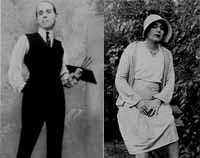In Celebration of Gay History Month

This week we are honoring two distinct pioneers in LGBT history whose paths crossed at a critical junction in early Nazi Germany, Magnus Hirschfeld and Lili Elbe, the Dr. who performed the first documented sex reassignment surgery and the recipient of that surgery.
Magnus Hirschfeld (1868-1935) was a German homosexual, sex researcher, and pioneer for normalizing homosexuality. In the 1890’s Germany was just entering into Europe as a country. This late identity as a nation resulted in an overwhelming desire of Germans to be viewed as modern. As a result, the study of sexuality as an aspect of progressive sociology gave slow rise to the acceptance of homosexuality as just another aspect of the human condition. Much progress had been made in the decriminalization of homosexuality, however, it was not to last.
Legislation prohibiting homosexual sex was enacted by the Reichstag in 1871 as paragraph 175 of the Reich Criminal Code, the punishment was imprisonment. As a result of paragraph 175, Hirschfeld founded the “Scientific Humanitarian Committee” in 1897. The committee had mostly homosexual members and its mission was to establish recognition of homosexuals and transgender men and women. In 1897 Hirschfeld wrote “Petition to the Reichstag” on behalf of The Scientific Humanitarian Committee. In the petition under paragraphs 3 and 4, Hirschfeld wrote:
3. Another important reason for the abolition [of paragraph 175] is the following: scientific research undertaken during the last twenty years in Germany, England and France, which studied in depth the question of homosexuality, has confirmed what the first scientist who considered this subject asserted without exception, that this way of love is constitutional. One of the reasons given was that homosexuality has occurred at all times, all over the world.
4. The experts pointed out that it is practically proved that the real cause of homosexuality, which at first glance looks like an enigma of nature, is due to development of the bisexual nature of man. The human foetus, during its first three months, is a bisexual organism. Therefore no moral guilt can possibly be attributed to homosexual sentiments (Blasius & Phelan, 1997, 135 – 137).
The entire text of Hirschfeld's "Petition to the Reichstag" can be found in "We are Everywhere: A Historical Sourcebook of Gay and Lesbian Politics" edited by Mark Blasius and Shane Phelan. In addition, further reading on the treatment of gay men in Nazi Germany can be found in "The Racial State: Germany 1933-1945" by Michael Burleigh and Wolfgang Wipperman.
Hirschfeld is also credited with creation of the theory of a third, intermediate sex between what is considered fully male and fully female. Hirschfeld was an author and playwright as well, with such works as “Sappho and Socrates” and the 1919 film “Different From the Others”.
It was Hirschfeld who consulted and participated in the first documented male to female sex reassignment surgery. It is theorized that Lili Elb, born Einer Wegener (1886 – 1931) was born an intersexual. In the 20s and 30s Wegener began living life as a female and legally changed his name to Lili Elbe.

Einar Wegener / Lili Elbe photo courtesy andrejkoymasky.com
In 1930 Lili underwent the first of several surgical procedures to complete the male to female transformation. The first surgery, removal of the male genitalia was performed by Dr. Magnus Hirschfeld in Berlin, subsequently followed by several surgeries performed by Dr. Warnekros. It remains a mystery what ultimately came of Lili after this series of surgeries, the last being to remove surgically implanted ovaries that resulted in medical complications.
Lili legally changed her sex in Denmark in the mid 1930’s after having the King of Denmark invalidate her marriage to wife Gerda. Lili was a true pioneer and ground breaker in the understanding of gender identity and this week takes her place in our tribute to historical gay pioneers.
Hirschfield’s research, writings, and scientific study combined with his ground breaking sex reassignment surgeries set the precedent for the future of the homosexual and transgender community. As the Third Reich and Adolf Hitler rose to power the prosecution of homosexual men became a priority as the cleansing of impurities in the German race began. Homosexuality did not fit into the Reich’s definition of what it meant to be a German and in 1933 the Nazis looted and burned the facilities of Hirschfeld's Scientific Humanitarian Committee. As the Hitler and the Nazis gained power, in 1936 Heinrich Himmler created the “Reich Central Office for the Combating of Homosexuality and Abortion”. Thus began the systematic elimination and execution of all men perceived to be homosexual in Germany. Some news films of Nazi book and library burnings are of the library of Magnus Hirschfeld. The burning of the facility occurred when Hirschfeld was on a world speaking tour, he never returned to Germany and died in exile in Nice on the French Riviera.
Magnus Hirschfeld stood up for what he believed, authored many books on sexual identity and homosexuality. He never referred to homosexuality as anything other than a normal dimension of the human condition. Some of his books such as “Sexual History of the World War” were considered to be acts of treason against Germany and were subsequently burned. Magnus Hirschfeld took on the Nazis, performed the first sex reassignment surgery, and pioneered a socially progressive community in Germany just as Washington was becoming the 42nd state in the union. For his innovation, perseverance, and courage, Magnus Hirschfeld is our gay pioneer this week.

<< Home